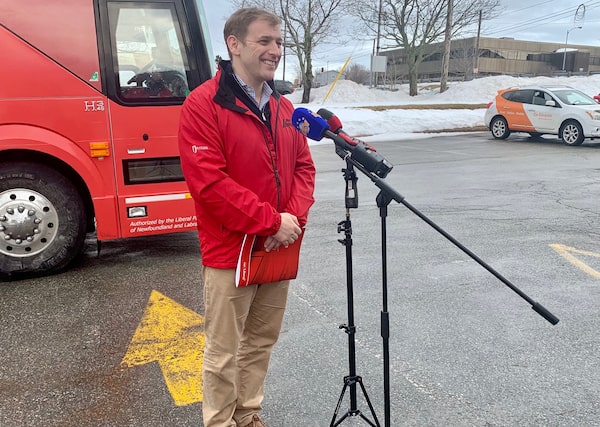
Liberal Leader Andrew Furey speaks to members of the media in St. John's on Feb. 4, 2021.Sarah Smellie/The Canadian Press
Lori Lee Oates is a lecturer in the Master of Philosophy (Humanities) program at Memorial University of Newfoundland and has worked in the senior levels of the provincial and federal governments.
Newfoundland and Labrador is holding its second election in less than two years – another campaign for the leadership of a troubled province where the same old story is playing out yet again.
Its longstanding financial problems and its crushing debt have been well-documented. In December, the federal government provided the province yet another bailout for the ill-fated Muskrat Falls hydroelectric project. This following the Bank of Canada’s purchase of provincial bonds in April of last year, which enabled the province to continue to make payroll. There have also been significant federal investments in the province’s ailing oil sector.
And yet, despite being on the brink of financial ruin, Newfoundland and Labrador’s politicians consistently promise not to make any cuts to services. No one, it seems, believes they can win an election in the province by alienating the public service unions. Former premier Danny Williams guaranteed there’d be no layoffs in 2003, for instance; Dwight Ball, who gave way to current Premier Andrew Furey last summer, did the same in 2015.
What comes next is that the new government proceeds to announce that the financial situation is far worse than they knew, and that significant cuts or tax hikes have to be made – decisive action that is inevitably rolled back after lobbying by stakeholders and the public. That’s the tack Mr. Williams took in 2004, announcing a tough budget and public service strike, as well as Mr. Ball, whose austere 2016 budget was the most unpopular in the province’s history. Then, spending increases, and the massive debt continues to grow.
Mr. Furey, for his part, has said that everything is on the table for fixing Newfoundland and Labrador’s debt problems. He announced a Premier’s Economic Recovery Team (PERT), which is being chaired by Dame Moya Greene – selected for her “change management skills,” but whose tenure as the former CEO of Canada Post was marked by an increase in workplace injuries by 15.4 per cent, and in grievances by 59.3 per cent, according to the Canadian Union of Public Employees. She is perhaps best known for her work in privatizing the British Royal Mail, and as a former federal deputy minister she was involved in the privatization of the Canadian National Railway Co. and the deregulation of the airline industry.
It has not proven to be a particularly effective, inclusive or transparent way to fix an ailing economy. On Jan. 5, Newfoundland and Labrador Federation of Labour president Mary Shortall resigned from the task force, referring to it as “window dressing.” Memorial University political economist Russell Williams has called the task force “broken” and “secretive.”
This is not Newfoundland and Labrador’s first foray into this kind of approach to economic recovery. In 1999, J. Douglas House – who had led the Economic Recovery Commission of former premier Clyde Wells a decade before – published Against the Tide: Battling for Economic Renewal in Newfoundland and Labrador. In his recommendations, Mr. House concluded that more creative approaches were needed. But in the end, few of the changes were implemented. The Roger Grimes government later carried out the Royal Commission on Renewing and Strengthening Our Place in Canada, which was more open and provided research. That laid the groundwork for Mr. Williams’s fight with Ottawa over the Atlantic Accord. The Williams government then developed an Energy Plan; the Ball government proceeded to pursue their economic roadmap, The Way Forward. And so the cycle continues.
On the campaign trail, the messaging has moved away from “change management” and the implementation of the report. Mr. Furey said that there will be “thorough” consultation around the recommendations before the report is tabled in the House of Assembly.
By the Premier’s own admission, the situation is “dire.” So why waste time on a closed-door process when he will need to pursue a more open process later? Why hire a change manager to do research? How can voters even trust the party platform?
Like most small polities, Newfoundland and Labrador has historically had centralized, highly controlled decision-making processes. All roads run through the Premier’s office. Such decision-making was at the heart of the failures in the Muskrat Falls approval processes – despite Mr. Furey’s insistence that a lot of lessons have been learned from that project.
So if past is prologue, the speech about how the province’s finances are even worse than we thought should be coming any day now – once the election is over, of course. It does not matter who wins. The playbook is always the same. Because this is Newfoundland and Labrador, where everything old is new again.
Keep your Opinions sharp and informed. Get the Opinion newsletter. Sign up today.